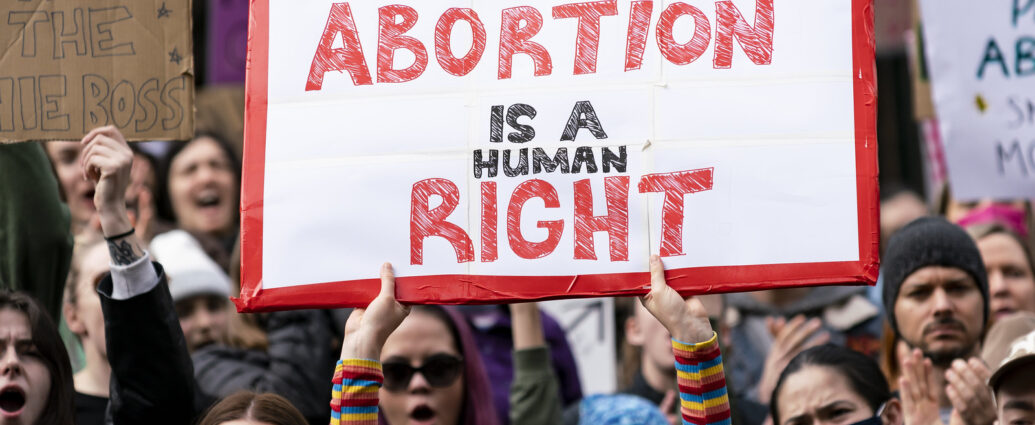Neve Dawson
In a historically momentous session, the French government has sealed abortion as a constitutional right, becoming the first country to explicitly do so.
The French Parliament voted to revise the country’s 1958 constitution to enshrine women’s “guaranteed freedom” to abort. It is the 25th amendment to modern France’s founding document.
While several other countries include reproductive rights in their constitutions, France is the first to explicitly state that an abortion will be guaranteed.
HOW THE VOTE CAME ABOUT
In a landslide victory, of 925 MPs and senators eligible to vote, 780 supported the amendment.
The upper and lower houses of the Nationale had already passed the measure, but final approval by parliamentarians in a joint session was the final step required.
Leaders from 18 different political groups were invited to speak on the change before votes were cast.
The reform was met with a standing ovation when it was announced in Versailles.
The text was authenticated and sent to the government, before a ceremony was held on International Women’s Day.
Prime Minister Gabriel Attal spoke on his support for the reform, stating: “Your body belongs to you and no one can decide for you.”
In Paris, the Eiffel Tower was illuminated with the message “My Body, My Choice” (“mon Corps, mon Choix“) to mark the occasion.
President Emmanuel Macron welcomed the “entry of a new freedom guaranteed in the Constitution” in a post to X, inviting members of the public to the International Women’s Day ceremony.
Fierté française, message universel.
Célébrons ensemble l’entrée d’une nouvelle liberté garantie dans la Constitution par la première cérémonie de scellement de notre histoire ouverte au public.
Rendez-vous ce 8 mars, journée internationale des droits des femmes. pic.twitter.com/dcwniEPei4
— Emmanuel Macron (@EmmanuelMacron) March 4, 2024
OPPOSITION TO THE REFORM
Macron has been criticised for using the constitutional change for electoral gain.
Criticism has also stemmed from anti-abortion groups, many of whom protested outside Versailles during the announcement.
“The place of women has changed because France has changed.”
Rightwing senators of the Républicains party have long been publicly opposed to the constitutional change.
The Vatican has reiterated its opposition to abortion, saying there “can be no right to take a human’s life” in a statement from the Pontifical Academy for Life.
HISTORY OF ABORTION RIGHTS IN FRANCE
Yaël Braun-Pivet, the first female leader of the National Assembly, has stated the constitutional change was needed since “the place of women has changed because France has changed.”
In eighteenth-century France, abortion was recognised as a crime punishable by 20 years imprisonment or, in some cases, death.
In 1920, new legislation prohibited abortion and the use of contraception in an effort to increase the population following its significant decrease during the First World War.
The last individual to be executed for performing abortion was Marie-Louise Giraud in 1943, who was sentenced to death for having practiced 27 illegal abortions on women in Cherbourg.
The introduction of the Veil Act in 1975, fronted by Holocaust survivor and first female President of the European Parliament Simone Veil, saw the legalisation of abortion in France. In 1974, Veil declared the need for legal abortions within France despite its illegality in the eyes of Catholic Doctrine.
In 2022, the legal limit for abortions in France was extended from 12 to 14 weeks of pregnancy. The early legal limit had forced thousands of women to travel abroad to terminate their pregnancies, often to the Netherlands or the UK where the limit is 24 weeks.
Later abortions can be made if two physicians have certified that the abortion is being performed to prevent physical or mental injustice to the mother or child.
ABORTION RIGHTS ON THE GLOBAL STAGE
Recent pro-choice activism has placed considerable pressure on the French government to make the reform.
France’s decision to reform the constitution appears reactionary, especially in light of the recent rollback of abortion rights in the United States, where the Supreme Court overturned a 50-year-old ruling.
French MPs have long contested American abortion policies, especially the Dobbs v. Jackson ruling which determined that the US Constitution does not confer a right to abortion.
If you have been affected by any of the issues raised, you can access support and advice in the UK from the NHS and the British Pregnancy Advisory Service.
READ NEXT:
-
MACRON PLEDGES TO ENSHRINE ABORTION RIGHTS IN FRENCH CONSTITUTION
-
UK HEALTHCARE PROFESSIONALS TOLD NOT TO REPORT ILLEGAL ABORTIONS
-
ABORTION SERVICES BUFFER ZONE BILL PUBLISHED IN SCOTLAND
Featured image courtesy of Matt Hrkac via Flickr. No changes were made to this image. Image license found here.

